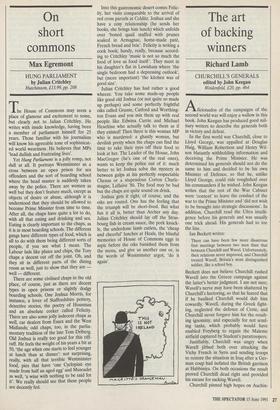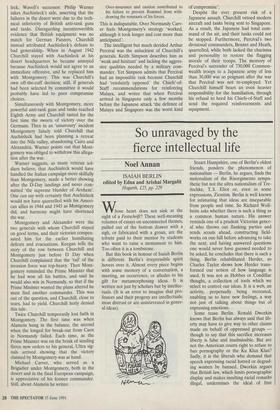The art of backing winners
Richard Lamb
CHURCHILL'S GENERALS edited by John Keegan Weidenfeld, £20, pp. 464 Aficionados of the campaigns of the second world war will enjoy a wallow in this book. John Keegan has produced good mil- itary writers to describe the generals both in victory and defeat.
In the first world war Churchill, close to Lloyd George, was appalled at Douglas Haig, William Robertson and Henry Wil- son blatantly withholding information and deceiving the Prime Minister. He was determined his generals should not do the same to him and decided to be his own Minister of Defence, so that he, unlike Lloyd George, could ride roughshod over his commanders if he wished. John Keegan writes that the rest of the War Cabinet were 'content' to leave the conduct of the war to the Prime Minister and 'did not wish to be brought into strategic discussions'. In addition, Churchill read the Ultra intelli- gence before his generals and was usually one trick ahead. His generals had to toe the line.
Ian Beckett writes:
There can have been few more disastrous first meetings between two men than that between Churchill and Wavel. Unfortunately, their relations never improved, and Churchill treated Wavell, Britain's most distinguished soldier, like a school boy.
Beckett does not believe Churchill rushed Wavell into the Greece campaign against the latter's better judgment. I am not sure; Wavell's nerve may have been shattered by Churchill's hectoring, so that he feared that if he baulked Churchill would dub him cowardly. Wavell, during the Greek fight- ing, neglected the defence of Crete, and Churchill never forgave him for the result- ing ignominy, and especially for not send- ing tanks, which probably would have enabled Freyberg to regain the Maleme airfield captured by Student's paratroopers.
Justifiably, Churchill was angry when Wavell jibbed both over attacking the Vichy French in Syris and sending troops to restore the situation in Iraq after a Ger- man coup had isolated the British garrison at Habbiniya. On both occasions the result proved Churchill dead right and provided his excuse for sacking Wavell.
Churchill pinned high hopes on Auchin- leck, Wave11's successor. Philip Warner takes Auchinleck's side, asserting that the failures in the desert were due to the tech- nical inferiority of British anti-tank guns and tanks. Disregarding incontrovertible evidence that British equipment was no match for German Panzers, Churchill instead attributed Auchinleck's defeats to bad generalship. When in August 1942 Churchill stayed with Auchinleck at his desert headquarters he became annoyed because Auchinleck would not agree to an immediate offensive, and he replaced him with Montgomery. This was Churchill's own off-the-cuff decision; still, if generals had been selected by committee it would probably have led to poor compromise choices.
Simultaneously with Montgomery, more powerful anti-tank guns and tanks reached Eighth Army and Churchill tasted for the first time the sweets of victory over the Germans. Then in an 'unsavoury' incident Montgomery falsely told Churchill that Auchinleck had been planning a retreat into the Nile valley, abandoning Cairo and Alexandria. Warner points out that Mont- gomery was obliged to withdraw this allega- tion after the war.
Warner suggests, as many veteran sol- diers believe, that Auchinleck would have handled the Italian campaign more skilfully than Montgomery, made a better showing after the D-Day landings and never com- mitted 'the supreme blunder of Arnhem'. One can say with certainty that Auchinleck would not have quarrelled with his Ameri- can allies in 1944 and 1945 as Montgomery did, and harmony might have shortened the war.
Montgomery and Alexander were the two generals with whom Churchill stayed on good terms, and their victories compen- sated him for the earlier humiliating defeats and evacuations. Keegan tells the story of the row between Churchill and Montgomery just before D Day when Churchill complained that the 'tail' of the invasion force was top-heavy. Then Mont- gomery reminded the Prime Minister that he had won all his battles, and said he would also win in Normandy, so that if the Prime Minister wanted the plans altered he must find another commander. This was out of the question, and Churchill, close to tears, had to yield. Churchill hotly denied this tale.
Twice Churchill temporarily lost faith in Montgomery. The first time was when Alamein hung in the balance, the second when the longed for break-out from Caen in Normandy failed. Each time, as the Prime Minister was on the brink of sending fierce new orders to his general, Ultra sig- nals arrived showing that the victory claimed by Montgomery was at hand.
Michael Carver, who served as a Brigadier under Montgomery, both in the desert and in the final European campaign, is appreciative of his former commander. Still, about Alamein he writes: Over-insurance and caution contributed to his failure to prevent Rommel from with- drawing the remnants of his forces.
This is indisputable. Over Normandy Carv- er feels Montgomery's strategy 'worked, although it took longer and cost more than anticipated'.
The intelligent but much derided Arthur Percival was the unluckiest of Churchill's generals. Keith Simpson describes him as 'weak and hesitant' and lacking the aggres- sive qualities needed by a military com- mander. Yet Simpson admits that Percival had an impossible task because Churchill had 'resolutely opposed' the Chiefs'-of- Staff recommendations for reinforcing Malaya, and writes that when Percival arrived in Singapore only a few months before the Japanese attack 'the defence of Malaya and Singapore was the worst kind of compromise'.
Despite the ever present risk of a Japanese assault, Churchill vetoed modern aircraft and tanks being sent to Singapore. As a result, the Japanese had total com- mand of the air, and their tanks could not be stopped. Furthermore, Percival's two divisional commanders, Bennet and Heath, quarrelled, while both lacked the charisma and personality to restore the flagging morale of their troops. The memory of Percival's surrender of 730,000 Common- wealth troops to a Japanese army of less than 30,000 was so poignant after the war that Percival was not re-employed. Yet Churchill himself bears an even heavier responsibility for the humiliation, through his refusal to heed his Chiefs-of-Staff and send the required reinforcements and equipment.



















































 Previous page
Previous page